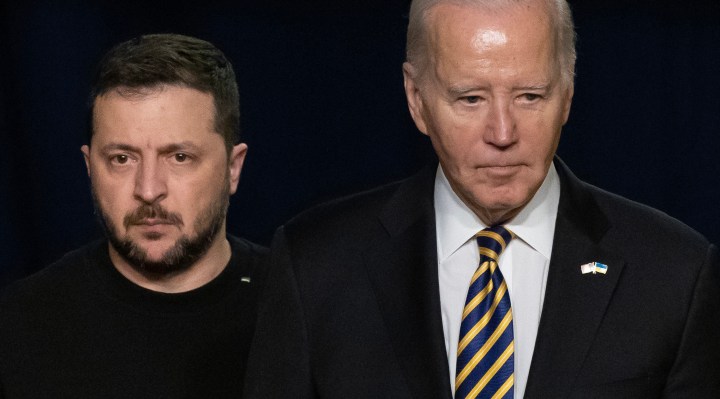UKRAINE UPDATE: 23 APRIL 2024
Biden tells Zelensky aid will flow swiftly; Norway considers big funding boost for Kyiv

US President Joe Biden told his Ukrainian counterpart Volodymyr Zelensky that his administration would move quickly to distribute security assistance if the Senate votes this week to approve an aid package including $61bn for Kyiv.
Norwegian parties were considering a “significant” increase to the country’s 75 billion kroner ($6.8-billion) long-term aid for Ukraine, according to Foreign Minister Espen Barth Eide.
Russia and China have almost completely stopped using the dollar in their mutual trade, Foreign Minister Sergey Lavrov said in Moscow on Monday, according to Tass.
Biden tells Zelensky Ukraine aid will flow quickly once Senate votes
US President Joe Biden told his Ukrainian counterpart Volodymyr Zelensky that his administration would move quickly to distribute security assistance if the Senate votes this week to approve an aid package including $61-billion for Kyiv.
During a call on Monday, Biden said the US aimed to swiftly ship the battlefield and air defence assistance, the White House said in a statement. The administration had already begun preparing a package that could head to Ukraine as soon as the president signs the Bill into law, a US official said last week.
Ukraine has lost ground in its efforts to hold back Russia’s invading forces in recent months as military assistance from the US has dried up. House Speaker Mike Johnson has struggled to navigate opposition to further Ukraine aid from some hardliners in his razor-thin Republican majority. Even with the expected additional US aid, it could be weeks before new assistance hits the front lines.
Still, Zelensky on Sunday said the assistance “will really strengthen the armed forces of Ukraine.”
Read more: Zelensky cheers US aid as Kyiv looks to retake initiative
“We did lose the initiative,” Zelensky said in an interview with NBC News. “Now we have all the chance to stabilise the situation and to overtake the initiative.”
The two leaders also discussed US economic assistance that aims to help Ukraine maintain financial stability during the war, the White House said.
Norway parties consider ‘significant’ boost to Ukraine aid
Norwegian parties were considering a “significant” increase to the country’s 75 billion kroner ($6.8-billion) long-term aid for Ukraine, according to Foreign Minister Espen Barth Eide.
“We will discuss this with the parliamentary leaders but we’re talking about a significant increase” of the Nansen programme, Eide told reporters in Oslo on Monday. While “we haven’t landed numbers”, the aid would be disbursed over “at least five” years “but maybe more”, he said.
“The sense is we all need to do more, and that nobody has done enough,” Eide said.
‘Russia, China almost dedollarised their trade’
Russia and China have almost completely stopped using the dollar in their mutual trade, Foreign Minister Sergei Lavrov said in Moscow on Monday, according to Tass.
More than 90% of settlements are carried out in the two countries’ national currencies, Lavrov said. He said that trade and economic cooperation between Russia and China were actively developing despite persistent attempts by Western countries to prevent this.
Economic ties between the two countries have boomed since Russia invaded Ukraine in 2022 and the West imposed sanctions. Trade between Russia and China increased by 26% to $240-billion in 2023.
Ukraine bonds extend losses as impact of US aid plan fizzles
Ukraine’s hard-currency bonds extended losses after a brief spike triggered by the approval of a $61-billion aid package by the US House of Representatives. Positive sentiment eroded as bondholders faced tough talks with the war-torn nation about another debt restructuring.
The country’s debt posted the best performance among emerging markets’ dollar bonds when trading resumed on Monday, before turning sharply lower. A bond due in September 2034 traded at 25.9 cents on the dollar as of 2.44pm in London, a sixth consecutive day of losses and the lowest level since February.
“There hasn’t been any meaningful buying flow” into Ukraine bonds following the US vote over the weekend, said Viktor Szabo, investment director for emerging markets debt at Abrdn. Meanwhile, “upcoming restructuring talks are adding a layer of complexity”, he said.
Russia oil refining curbed by flood as drone damage persists
Russian weekly oil refining was near an 11-month low as flooding hampered operations, and repairs to plants affected by drone attacks slowed down.
Russia processed 5.22 million barrels of crude a day from 11-17 April, according to a person with knowledge of industry data. That’s about 10,000 barrels a day, or 0.2%, below the average of the previous seven days, Bloomberg calculations show.
With the invasion of Ukraine well into its third year, Kyiv has been using drones to hit Russia’s most important industry. The Ukrainian government has defended that strategy in the face of US concerns, saying it’s seeking to curb fuel supplies to the front line and cut the flow of petrodollars to Kremlin coffers.
Earlier this year, drones targeted key Russian refineries, causing their partial or complete shutdown. There’s been no further damage during the past month, giving operators time to conduct repairs, yet the pace of recovery has slowed.
Severe weather has also affected processing, with floods in Russia’s Urals region forcing the Orsk refinery offline on 7 April. In the latest reporting period, the facility didn’t process any crude, according to the person familiar with the matter.
In the previous seven days, the facility had churned through an average 26,500 barrels a day. The loss of those volumes became one of the biggest contributors to the overall decline in Russian processing rates from 11-17 April, the person said. Orsk was preparing to restart operations, the facility’s press service said on Friday. DM





Comments - Please login in order to comment.